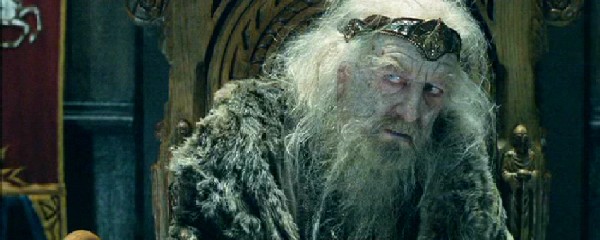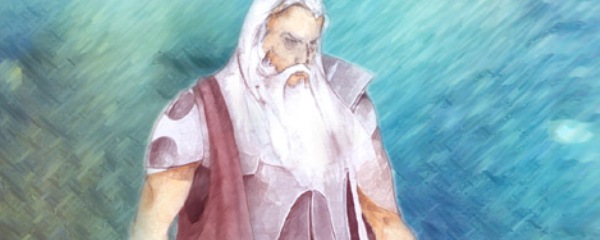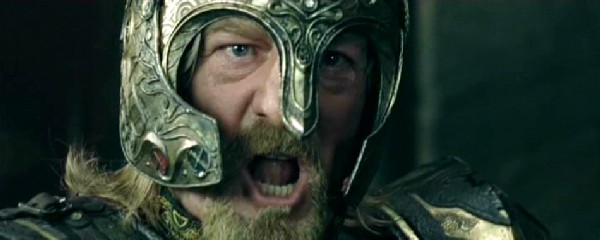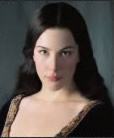Théoden by atalante_star

Théoden is one of those characters that changes dramatically between the book and the film – not just in appearance, but in manner, in his view of his land, his people, and his destiny.
Our first view of Théoden – under the influence
Théoden is introduced in both the books and the movies as a spent force, having ceded his power to Gríma Wormtongue. He rules in name only, allowing Gríma’s words to dictate his actions.
The position to which Gríma had risen in the court by TA 3019 – and the weary resignation with which most Rohirrim then viewed the situation – was clear from the first in both book and film (though there is no indication of his life story in the film). From the book:
“It is the will of Théoden King that none should enter his gates, save those that know our tongue and are our friends. … It is but two nights ago that Wormtongue came to us and said that by the will of Théoden no stranger should pass these gates.”
…
“Strange names you give indeed! But I will report them as you bid, and learn my master’s will,” said the guard. “Wait here a little while, and I will bring you such an answer as seems good to him. Do not hope too much! These are dark days.”
And from the film:
Éomer: He was ambushed, by orcs. (Théoden looks unresponsive and uncaring) If we don’t defend our county, Saruman will take it by force.
Gríma: That is a lie.(Gríma appears coming around the corner and takes his place by Théoden’s side) Saruman the White has ever been our friend and ally.
Théoden: (whispering) Gríma.
(Gríma bends down to hear the King his eyes still on Éowyn and Éomer.)
Théoden: Gríma. (whispers something unintelligible) Gríma.
He remains almost unseeing and unknowing on his throne as Gríma banishes Éomer (using a warrant signed by Théoden in a wavery hand) and as Éowyn begs him to come and see the dying Théodred.
Our first view of Théoden in the book is as an old man sitting on his throne, Wormtongue at his feet, and Éowyn standing behind him. He is described as bent with age, with long white hair falling in great braids from beneath a gold circlet in which was set a single white diamond. His beard reached to his knees. When he stood, he used a short black staff with a handle of white bone to support himself. However, Gandalf and the others could still see the strong man whom he had been. His blue eyes burned with a bright light, he was tall, and they saw that in his youth he must have been “high and proud indeed”.
The film version of Théoden is rather similar. He is certainly bent with age, with long white hair sprouting out over a tarnished bronze-looking circlet. He is dressed in old moth-eaten robes, with an outer robe of fur, and on his feet are old and ruined boots. No sign of the proud king remains as he slumbers on his throne, Gríma at his side.

The transformation
Théoden’s initial welcome to Gandalf is similar in both the book and the film. It is short, uncertain, and highly tempered by the version of events that was fed to him by Wormtongue. In both versions he questions why he should believe Gandalf Storm-crow.
The release of Théoden from Wormtongue’s influence in the book is much less dramatic than in the film. In the book, Gandalf simply encourages him out of his chair, and takes him out of the Golden Hall to look over Rohan.
“Take courage, Lord of the Mark; for better help you will not find. No counsel have I to give to those that despair. Yet counsel I could give, and words I could speak to you. Will you hear them? They are not for all ears. I bid you come out before your doors and look abroad. Too long have you sat in shadows and trusted to twisted tales and crooked promptings.”
Slowly Théoden left his chair. A faint light grew in the hall again.
…
“Now, lord,” said Gandalf, “look out upon your land! Breathe the free air again!”
Théoden looked out, over his lands – the green fields, the river glittering like glass, a storm rolling away over the East, and a sharp stab of sunlight coming down from between the clouds. And gained his release from the influence of Saruman: “From the king’s hand the black staff fell clattering on the stones. He drew himself up, slowly, as a man that is stiff from long bending over some dull toil. Now tall and straight he stood, and his eyes were blue as he looked into the opening sky.
“Dark have been my dreams of late,” he said, “but I feel as one new-awakened. I would now that you had come before, Gandalf. For I fear that already you have come too late, only to see the last days of my house.”
The Théoden of old seemed to return more clearly when he holds a sword once more. He first takes Éomer’s sword, holding it aloft, swinging it shimmering and whistling in the air, and crying out in Rohirric:
“Arise now, arise, Riders of Théoden!
Dire deeds awake, dark is it eastward.
Let horse be bridled, horn be sounded!
Forth Eorlingas!”
At that, his guards, draw their swords and lay them at his feet, a sign of fealty and love. In return, Théoden immediately promises to fight in the upcoming war, whether it mean glory and victory, or defeat and death: “I myself will go to war, to fall in the front of the battle, if it must be. Thus shall I sleep better.”
“Then even the defeat of Rohan will be glorious in song,” said Aragorn. The armed men that stood near clashed their weapons, crying: “The Lord of the Mark will ride! Forth Éorlingas!””
Háma is then sent to fetch Herugrim.
This is vastly different from the film, where we first see Gandalf, dressed in a grey cloak, approaching the throne and commanding Saruman to leave his mind). Saruman-through-Théoden informs Gandalf that his power is nor great enough, so Gandalf reveals himself as Gandalf the White and jabs his staff towards Théoden. Saruman then says that he will kill Théoden if Gandalf tries to dislodge him from the Rohir’s mind. Gandalf jabs his staff towards him again, and eventually breaks the connection to Saruman.
Théoden then undergoes a remarkably physical transformation into the golden-haired king he once was, and after receiving Herugrim from Háma, he immediately directs his attention onto Gríma. Wielding his sword he pursues Gríma out of the Golden Hall and down its steps, only being stopped by Aragorn from killing Wormtongue. He then receives the fealty of his people
Théodred’s funeral
Another film-only scene where Théoden leads the mourners at the barrows. It contains one of the two instances where I think book-Théoden and film-Théoden really coincide, in feeling and emotion, if not in actual action:
Théoden: A Simblemynë. Ever has it grown on the tombs of my fore bearers. Now it shall cover the grave of my son. Alas that these evil days should be mine. The young perish, and the old linger. That I should live to see the last days of my house.
Gandalf: Théodred’s death was not of your making.
Théoden: No parent should have to bury their child.
In that short exchange is seen the doom-laden nature of the book Rohirrim, ever conscious of life and death, the transient nature of their lives but the constancy and continuation of the line of the kings.
His next actions
Again the book and the film are vastly different.
In the book, Théoden’s first act is to order the muster of the Rohirrim, and Gandalf urges him to take his forces to Helm’s Deep, rather than going to the Fords of Isen, where Théodred had been slain. Théoden takes his advice and starts on the journey to the Hornburg with the Rohirrim.
The king’s sense of doom was already well-developed by this time in the book – a noticeable omission from the film, and I think a bad one. As with all Rohirrim, he does not fear death in battle – which was considered an honourable and glorious end – and the sense of doom-laden destiny in the book is integral to the spirit of the Rohirrim: “Behold! I go forth, and it seems like to be my last riding,” said Théoden. “I have no child. Théodred my son is slain. I name Éomer my sister-son to be my heir. If neither of us return, then choose a new lord as you will.”
That quote shows in itself the absolute difference in the Rohirric sections of the book and the film. In the book, Théodred dies in battle, in the film, he dies in Meduseld. In the book, Éomer remains well-respected and becomes Théoden’s worthy heir on the death of Théodred. In the film, he is banished by Gríma. In the book, Théoden is advised to go to Helm’s Deep. In the film, he decides to withdraw to Helm’s Deep in opposition to Aragorn’s wishes – barricading the Rohirrim in the Hornburg is seen pretty much as “running away” from the main battle.
Théoden: When I last looked, Théoden, not Aragorn, was King of Rohan.
Gandalf: Then what is the King’s decision?
(Outside, in Edoras)
Háma: By order of the King, the city must empty. We make for the refuge of Helm’s Deep. Do not burden yourself with treasures. Take only what provisions you need.
Gandalf: Helm’s Deep! They flee to the mountains when they should stand and fight. Who will defend them if not their King?
Aragorn: He is only doing what he thinks is best for his people. Helm’s Deep has saved them in the past.
Gandalf: There is no way out of that ravine. Théoden is walking into a trap. He thinks he’s leading them into safety. What they’ll get is a massacre.
The journey to Helm’s Deep is shown only in the film. The warg fight, Théoden asking Éowyn to led their people to Helm’s Deep, and his witnessing of the “passing” of Aragorn are not in the book at any point.
Preparation for battle
Again, the book and the film are very different.
In the book, there is actually little mention of Théoden during the Battle of the Hornburg. It is Éomer who marshals the Rohirric troops in the field, and so presumably Théoden remained in a command position in the Hornburg until the final moments. As such, there is little we can do to compare his actions during the film battle and the book battle until we reach the final charge.
In preparation for the film battle, Théoden is seen almost as unaware of his true situation. He does not realise that Saruman’s army is now after more than just wanton destruction, he is seen as bitter that he appears to be has been left alone to fight this war without the aid of his traditional ally, Gondor.
Théoden: They will break upon this fortress like water on rock. Saruman’s hordes will pillage and burn. We’ve seen it before. Crops can be resown, homes rebuilt. Within these walls we will outlast them.
Aragorn: They do not come to destroy Rohan’s crops or villages. They come to destroy its people, down to the last child.
Théoden: What would you have me do? Look at my men. Their courage hangs by a thread. If this is to be our end, then I would have them make such an end as to be worthy of remembrance.
He is next seen in the Hornburg, standing alone in the middle of one of the halls. Rays of sunlight streak through the door behind him, making it seem as if he is surrounded only by a halo of light. Gamling proceeds to put his armour on the king as Théoden stands still. Then comes (after a bit of un-typically Rohirric self-doubt) what I consider to be one of the best additions to the film, Théoden managing to come up with something totally and utterly Rohirric, an abbreviated version of Eorl’s Hymn.
Théoden: Where is the horse and the rider? Where is the horn that was blowing? They have passed like rain on the mountains. Like wind in the meadow. The days have gone down in the West, behind the hills, into shadow. How did it come to this?
His musings are then interrupted by the sound of the elves arriving from Rivendell, and he goes out to meet them, looking rather bewildered by their presence.

The Battle of the Hornburg
At the start of the film version of the battle, Théoden is standing with Gamling and another Rohir in the centre of the keep. He directs the firing from the Rohirrim, but as much of the action is directed towards Aragorn and the elves, little more can be said. He looks suitably horrified when the big hole is blown in the Deeping Wall, and then is seen telling his men to brace the gates. He tells Aragorn to retreat to the Keep, and then rushes in with the Rohirrim to fight back the Orcs’ trying to attack the outer gates.
When he realises that the outer defences are lost, he walks away from the gates, bidding his commanders to draw back everyone into the Keep. Looking defeated, he asks Aragorn an almost rhetorical question, but gaining inspiration again from the man’s answer:
Théoden: So much death. What can Men do against such reckless hate?
Aragorn: Ride out with me. Ride out and meet them.
Théoden: For death and glory.
Aragorn: For Rohan. For your people.
…
Théoden: Yes. Yes. The horn of Helm Hammerhand shall sound in the Deep one last time.
…
Théoden: Let this be the hour when we draw swords together.
…
Théoden: Fell deeds, awake. Now for wrath, now for ruin and a red dawn. Forth Eorlingas!
And with this charge (though there, Théoden in the film is guilty of stealing some of Éomer’s best lines from the book) the film and the book finally again coincide. From the book:
“And with that shout the king came. His horse was white as snow, golden was his shield, and his spear was long. At his right hand was Aragorn, Elendil’s heir, behind him rode the lords of the House of Eorl the Young. Light sprang in the sky. Night departed.
“Forth Eorlingas!” With a cry and a great noise they charged. Down from the gates they roared, over the causeway they swept, and they drove through the hosts of Isengard as a wind among grass.”
Then in both film and book, Théoden and his riders drive a path through the attackers to the Dike, from where they see the arrival of reinforcements led by Gandalf and Erkenbrand (book) or Éomer (film).
There is then one last view of Théoden in the film, looking out over Mordor with Gandalf, Aragorn, Legolas, Gimli and Éomer, looking into a future full of Sauron’s retribution.
- Éomer
- Éowyn
- GrÃma Wormtongue
- Théodred
Interesting Links:
Our Character Gallery has a separate section devoted to Théoden.
It also has the screencaps of the theatrical version, as well as the extended edition.
A transcript of 'The Lord Of the Rings: The Two Towers' can be found in our Film Fun & Facts section.
A summary of 'The Lord Of the Rings: The Two Towers' can be found in Elrond's Library.
You can also check out some pictures of Bernard Hill in our Cast & Crew Gallery or read a short biography in our Film, Fun & Facts section.
Some articles that are related to King Théoden:
- Our Middle-earth Section has a family of the Kings of the Mark, an article about The History of the Rohirrim (by Nienna-of-the-Valar) and Théoden son of Thengel.
- Under Literature Studies you can find an article about Rohan culture and Eorl's Hymn.
- The Weaponry Section has articles about The Battle of Helm's Deep, The Fighting Styles of the Rohirrim and Herugrim in the Movie.
Forum threads related to King Théoden / Bernard Hill:
- The Movie Forum has a thread about the Characterisation of Théoden.
- In the Books Forum Théoden in light of his Tragic Character Flaws.
- The Casting Forum has a thread discussing Bernard Hill's Performance.
Take a look at how some artists saw Théoden in The Two Towers:
- King Théoden by Ivar Allen
- GrÃma, Théoden and Éowyn by Ralph Bakshi
- Théoden by John Howe
- The Golden Hall of Théoden by Pauline Martin
- Gandalf and GrÃma by Michelucci
- In the Golden Hall by Montanini
Looking for something more creative - you may find it here:









